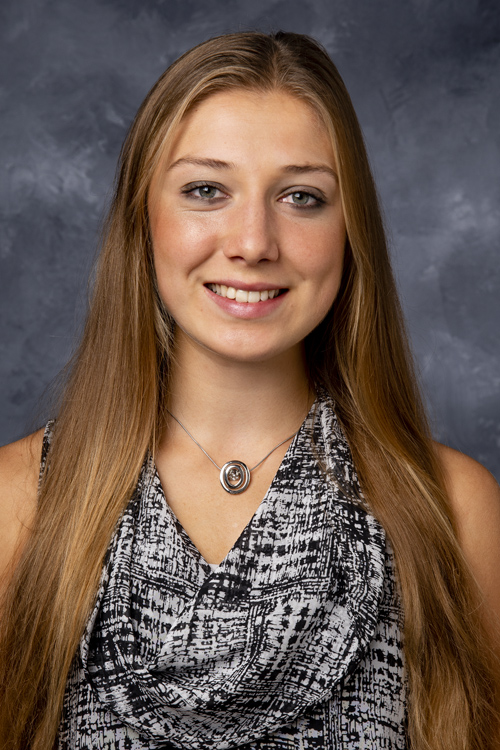
Marissa Mueller, Undergraduate student, Biomedical Engineering
Evaluates activity trackers
• Hometown: Petrolia, Ontario, Canada
• Faculty mentor/advisor: Laura Frey Law, Associate Professor, Physical Therapy and Rehabilitation Science
• What is your degree program and expected graduate date? I am currently studying Biomedical Engineering (Cellular Engineering), Pre-Medicine, and will be graduating in May 2021.
• Please describe your research: We are interested in evaluating how physical activity (PA) is quantified in ActiGraph accelerometers—the research-grade counterpart to Nike Fuel Bands and Fitbits. We compared exhaustive combinations of select algorithms and filters in the ActiLife software program to evaluate differences between PA estimates for identical data sets (e.g. daily calories, steps, time spent in moderate-to-vigorous PA). Large differences indicate that objective measures may not be as accurate as commonly perceived, emphasizing a need for standardization in recreational, clinical and research applications.
• In simple terms, why does this research matter? Objective physical activity estimates have increasing applications in recreational and research settings (i.e. quantifying daily caloric outputs and steps). Prescribed activity is also an emerging frontier in preventative and rehabilitative medicine. Better understanding how such measures are calculated (as well as standardizing and thoroughly documenting methods) is essential so investigators and clinicians can better interpret data and take caution when comparing measures between studies or with absolute values (i.e. meeting PA guidelines).
• How soon after starting at the University of Iowa were you able to participate in research? I started participating in undergraduate research in the spring semester of my freshman year after being encouraged to do so through the Honors program.
• How has being involved in research made you more successful at the University of Iowa? Becoming involved in research has helped shape my career goals and contextualize academic interests. I had never been exposed to research before attending Iowa; upon joining this lab, I quickly fell in love with the scientific process and working with other students/professors in an academic setting. This previously foreign field is now something I want to pursue professionally. It has also changed my perspective in current studies from strictly conceptual to more practical—I love looking for and easily finding constant connections between classroom topics and real-world applications. Exposure to interdisciplinary research keeps me in constant awe of (and respect) for science/engineering and further motivates me to pursue this dynamic field.
• What are your career goals and/or plans after graduation? Upon graduation, I will be applying to MD/PhD programs and additional fellowship/research opportunities. I ultimately want to engineer new technologies, make an impact on the global research community, and apply such innovation to clinical practice as a physician-scientist.
Related story: Student athletes flex mental muscle in UI research labs
UI Stories feature: Excelling in yet another field
Banner location: not on display—
